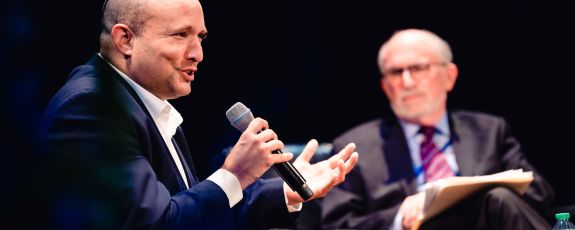
Former Israeli Prime Minister Discusses Middle East Issues
Naftali Bennett was country’s prime minster from 2021-22
Following the Abraham Accords, Bennett became the first Israeli Prime Minister to visit the United Arab Emirates and Bahrain.
“My political inclination is right of center. So I guess in America I would be considered a moderate Republican,” Bennett told the audience at Page.
Asked by moderator Bruce Jentleson, a former state department adviser now a professor in the Sanford School of Public Policy, about his position on a Palestinian state, Bennett replied:
“First of all, the reality on the ground is that there was millions of Jews and Israelis in the land of Israel, and there's millions of Palestinians. And both sides are here to stay. And we'd better figure out how we're going to get along for the next 50 and 100 years, because no one's going anywhere,” he said.
“And at the end of the day, no one outside will solve our problems, we have to work it out. We tried the Palestinians’ approach twice already. And while the Israeli public supported a Palestinian state approach, the consensus in Israel today, and I'm part of it, is that it doesn't work. And you need to figure out another path. And it's not an easy path.”

He said Israel needs to forge its future and not rely heavily on allies, including the United States.
“Folks in the Middle East feel that different American administrations have very different policies. So it's very volatile,” he said. “… It's our responsibility to shape the Middle East, vis a vis the big enemy, the big bully in the neighborhood in Iran.
“We can ask for America to give us sort of an umbrella, but we have to do the job. And I really liked that idea. I believe that you shouldn't wait for some babysitter that shapes our future,” Bennett said. “By the way, I would say this to students as well, generally in life, don't wait for anyone else to take care of things … you’ve got to take care of your destiny.”
Before politics, Bennett was a combat soldier in Sayeret Matkal and a company commander in the Maglan Special Forces Unit, and commanded search and destroy missions during the Second Lebanon War.
He called Iran “an octopus of terror,” and said Israel for years had essentially been fighting the octopus’ finger tips – what he referred to as Iran-funded proxies including Hezbollah in Lebanon and Islamic Jihad in Gaza.
“I do not want to fight the fingertips of this octopus in Lebanon, in Gaza,” Bennett said. “I don't want to send Israeli boys to fight on our borders, as far as I can. I want to take our national security energy … and focus on the head. And the head is in Tehran, 1,000 kilometers from me, from Israel. So if I'm fighting an octopus, I don't want to fight its arms, I want to fight its head. And this was a profound change.”
Citing “foreign press” reports, he mentioned apparent retaliatory attacks inside Iran following attempted assaults on Israelis.
Sporadic jeers broke out during the first 20 minutes of Bennett’s talk. “Screaming is not the best method . … I respect those folks’ right to demonstrate … (it’s) part and parcel of vibrant democracy,” Bennett told the crowd, largely a mix of students, faculty and administrators. “But does that change anyone's mind? No.”
Members of the audience who wanted to ask a question were given note cards as they entered Page Auditorium. Jentleson presented a handful of these questions during the final 20 minutes or so of the 90-minute event.
“Why hasn’t Israel supported the economic sanctions against Russia?” Jentleson read from a card.
Bennett said Israel was the first to set up a field hospital in Ukraine, but his government did not support sanctions for two reasons: the potential risk to the large number of Jews who live in Russia and the danger it would create for his military pilots who could face Russian surface-to-air missile attacks when conducting air raids on an “Iranian presence” inside Syria.
Had Israel supported the sanctions, “it would have would have been much harder to rescue” thousands of Jewish refugees in Russia and Ukraine, he said.
Bennett spoke at Duke at a moment of political tension in his country. Israel has been rocked by waves of protests over the government’s efforts to take greater control over the country’s judicial system. Simultaneously, violence has flared between Israelis and Palestinians.
Bennett said the strife in Israel today is “its biggest crisis, domestic crisis, since its establishment. And it's entirely domestic, it's not been imposed on us by any means by neighbors, by the United States, nothing. It's all made in Israel.”
“And what we're seeing, by the way, we're seeing a lot of problems. But we're also seeing a lot of beauty. We are seeing masses of Israelis going out on the streets and fighting for democracy, fighting for freedom, fighting for Israel's future, because they care. And I'll give you a spoiler of something that I can say now that I wouldn't say even a month ago -- democracy will prevail.”
The Duke Center for Jewish Studies, in cooperation with Jewish Life at Duke and The Program in American Grand Strategy, sponsored the event.